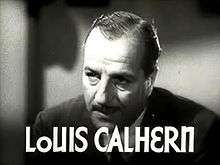Louis Calhern
| Louis Calhern | |
|---|---|
 from the trailer for Woman Wanted (1935) | |
| Born |
Carl Henry Vogt February 19, 1895 Brooklyn, New York, U.S. |
| Died |
May 12, 1956 (aged 61) Tokyo, Japan |
| Occupation | Actor |
| Years active | 1921-1956 |
| Spouse(s) |
Ilka Chase (1900-1978) (m.1926-1927; divorced) Julia Hoyt (1897-1955) (m.1927-1932; divorced) Natalie Schafer (1900-1991) (m.1933-1942; divorced) Marianne Stewart (1922-1992) (m.1946-1955; divorced) |

Louis Calhern, born Carl Henry Vogt, (February 19, 1895 – May 12, 1956) was an American stage and screen actor.[1] For portraying Oliver Wendell Holmes in The Magnificent Yankee (1950), he was nominated for the Academy Award for Best Actor.
Early life
Calhern was born in Brooklyn, New York, the son of Eugene Adolf Vogt and Hubertina Friese Vogt, both of whom were natives of Germany. He had one sibling, a sister.[2] His father was a tobacco dealer.[3] His family left New York while he was still a child and moved to St. Louis, Missouri, where he grew up. While Calhern was playing high school football, a stage manager from a touring theatrical stock company spotted him, and hired him as a bit player. (Another source says, "Grace George hired his St. Louis high school football team as supers for a Shakespearean play.")[3]
Stage
Just prior to World War I, Calhern decided to move back to New York to pursue an acting career. He began as a prop boy and bit player with touring companies and burlesque companies. He became a matinee idol by virtue of a play titled Cobra
Calhern's Broadway credits include Roger Bloomer (1923), The Song and Dance Man (1923-1924), Cobra (1924), In a Garden (1925-1926), Hedda Gabler (1926), The Woman Disputed (1926-1927), Up the Line (1926), The Dark (1927), Savages Under the Skin (1927), A Distant Drum (1928), Gypsy (1929), The Love Duel (1929), The Rhapsody (1930), The Tyrant (1930), Give Me Yesterday (1931), Brief Moment (1931-1932), The Inside Story (1932), Birthday (1934-1935), Hell Freezes Over (1935-1936), Robin Landing (1937), Summer Night (1939), The Great Big Doorstep (1942), Jacobowsky and the Colonel (1944-1945), The Magnificent Yankee (1946), The Survivors (1948), The Play's the Thing (1948), King Lear (1950-1951), and The Wooden Dish (1955).[4]
Military service
Calhern's burgeoning career was interrupted by the war, and he served overseas in the 143rd Field Artillery of the United States Army during World War I.[5]
Film
Calhern started working in silent films for director Lois Weber in the early 1920s; the most notable being The Blot in 1921. A 1921 newspaper article commented, "The new arrival in stardom is Louis Calhern, who, until Miss Weber engaged him to enact the leading male role in What's Worth While?, had been playing leads in the Morosco Stock company of Los Angeles."[6]
In 1923 he left the movies, but would return to the screen eight years later after the advent of sound pictures. He was primarily cast as a character actor in films while he continued to play leading roles on the stage. He reached his peak in the 1950s as a Metro-Goldwyn-Mayer contract player. Among his most memorable screen roles were Ambassador Trentino in the Marx Brothers classic Duck Soup (1933) and three that he appeared in at MGM in 1950: a singing one as Buffalo Bill in the film version of Annie Get Your Gun, the double-crossing lawyer and sugar-daddy to Marilyn Monroe in John Huston's The Asphalt Jungle, and his Oscar-nominated role as Oliver Wendell Holmes in The Magnificent Yankee (re-creating his stage role). He was also praised for his portrayal of the title role in Joseph L. Mankiewicz's film Julius Caesar in 1953 (adapted from Shakespeare's play).
He also played the grandfather in The Red Pony (1949), adapted from the novel by John Steinbeck and starring Robert Mitchum, and the spy boss of Cary Grant in the Alfred Hitchcock suspense classic Notorious (1946). A performance as Uncle Willie in High Society (1956), a musical remake of The Philadelphia Story, turned out to be his final film.
Marriages
Calhern was married four times. First, to Ilka Chase from 1926 to 1927, then to Julia Hoyt from 1927 to 1932, and then to Natalie Schafer from 1933 to 1942, and Marianne Stewart from 1946 to 1955. All four marriages ended in divorce.
Death
Calhern died of a sudden heart attack in Nara, Japan, while filming The Teahouse of the August Moon.[7] He was replaced in the film by Paul Ford, who had played Calhern's role in the original stage version. By an odd coincidence, when playing Buffalo Bill in Annie Get Your Gun, Calhern had replaced Frank Morgan, who had died of a sudden heart attack during the making of that film. Calhern is interred at Hollywood Forever Cemetery.
Broadway
- Cobra (1921) as Jack Race
- Gypsy (1929) as Cleve
- The Magnificent Yankee (1946) as Justice Oliver Wendell Holmes, Jr.
Partial filmography
References
- ↑ Obituary Variety, May 16, 1956.
- ↑ Dennis, Ken (Summer 2011). "Louis Clhern: Distinguished Gentleman". Films of the Golden Age (65): 58–68.
- 1 2 "Greetings". Mexico Evening Ledger. Mexico, Missouri. February 18, 1952. p. 6. Retrieved February 13, 2016 – via Newspapers.com.

- ↑ "Louis Calhern". Playbill Vault. Retrieved 13 February 2016.
- ↑ "Actor Favors Showing German War Pictures". The Gazette Times. Pittsburgh, Pennsylvania. June 12, 1921. p. 44. Retrieved February 13, 2016 – via Newspapers.com.

- ↑ "Star Studies". Oregon, Portland. The Oregon Daily Journal. January 16, 1921. p. 44. Retrieved February 13, 2016 – via Newspapers.com.

- ↑ Katz, Ephraim (1979). The Film Encyclopedia: The Most Comprehensive Encyclopedia of World Cinema in a Single Volume. Perigee Books. ISBN 0-399-50601-2. P. 195
External links
| Wikimedia Commons has media related to Louis Calhern. |
- Louis Calhern at the Internet Movie Database
- Louis Calhern at AllMovie
- Louis Calhern at the Internet Broadway Database
